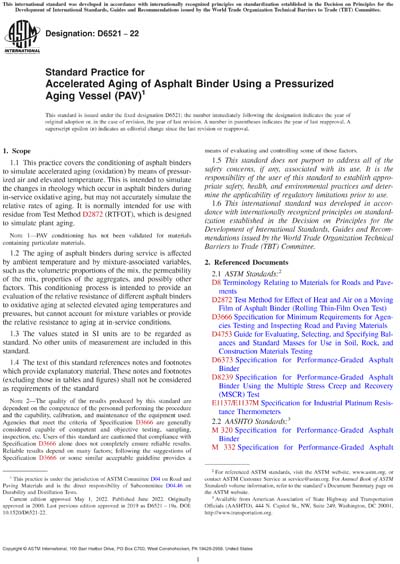Most recent
ASTM D6521-22
Standard Practice for Accelerated Aging of Asphalt Binder Using a Pressurized Aging Vessel (PAV)
1.1This practice covers the conditioning of asphalt binders to simulate accelerated aging (oxidation) by means of pressurized air and elevated temperature. This is intended to simulate the changes in rheology which occur in asphalt binders during in-service oxidative aging, but may not accurately simulate the relative rates of aging. It is normally intended for use with residue from Test Method D2872 (RTFOT), which is designed to simulate plant aging.
Note 1:PAV conditioning has not been validated for materials containing particulate materials.
1.2The aging of asphalt binders during service is affected by ambient temperature and by mixture-associated variables, such as the volumetric proportions of the mix, the permeability of the mix, properties of the aggregates, and possibly other factors. This conditioning process is intended to provide an evaluation of the relative resistance of different asphalt binders to oxidative aging at selected elevated aging temperatures and pressures, but cannot account for mixture variables or provide the relative resistance to aging at in-service conditions.
1.3The values stated in SI units are to be regarded as standard. No other units of measurement are included in this standard.
1.4The text of this standard references notes and footnotes which provide explanatory material. These notes and footnotes (excluding those in tables and figures) shall not be considered as requirements of the standard
Note 2:The quality of the results produced by this standard are dependent on the competence of the personnel performing the procedure and the capability, calibration, and maintenance of the equipment used. Agencies that meet the criteria of Specification D3666 are generally considered capable of competent and objective testing, sampling, inspection, etc. Users of this standard are cautioned that compliance with Specification D3666 alone does not completely ensure reliable results. Reliable results depend on many factors; following the suggestions of Specification D3666 or some similar acceptable guideline provides a means of evaluating and controlling some of those factors.
1.5This standard does not purport to address all of the safety concerns, if any, associated with its use. It is the responsibility of the user of this standard to establish appropriate safety, health, and environmental practices and determine the applicability of regulatory limitations prior to use.
1.6This international standard was developed in accordance with internationally recognized principles on standardization established in the Decision on Principles for the Development of International Standards, Guides and Recommendations issued by the World Trade Organization Technical Barriers to Trade (TBT) Committee.
ASTM International [astm]

